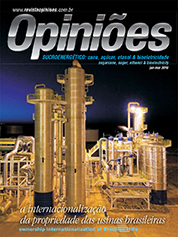Ricardo de Gusmão Dornelles
Director of Renewable Fuels of the Ministry of Mines and Energy
Op-AA-23
Internationalization contributes to making ethanol a commodity
Ownership internationalization is at times seen as a threat to national sovereignty and questioned by the most passionate. In a strategic field, such as the energy industry, the debate becomes more apparent. The slogan “The oil is ours”, generalized in the 50’s, leaves no doubt: the country cannot prescind from sovereignty over its riches.
However, if the debate in Brazil quite often is ideological, one cannot state that decisions by the State are dominated by this bias, at a time well into the 21st Century. The concept “energy safety” evolves and does not necessarily mean ownership, but rather supply guarantee and diversification of sources. Mexico is a typical case. There, oil is a sensitive issue for public opinion.
Oil is a State monopoly throughout the production and distribution chain, and the Constitution expressly prohibits any participation by foreign companies. In this case, the issue of ownership internationalization reaches the point of rendering unfeasible any investments that would provide Mexico the conditions to sustain its energy independence in the medium and long term.
In 1999, when the Brazilian sugar-based energy sector deregulation was completed, there was practically no foreign presence. In 2008, this participation was at 12% and, according to the Ministry of Agriculture, Cattle Breeding and Supply, currently more than 15% of cane crushing in Brazil is under the control of foreign companies.
Internationalization shows that conditions to invest, as well as the regulatory mark, albeit not ideal, are at least satisfactory in the assessment of these investors. These investments show that the country honors contracts, has good macroeconomic fundaments and great potential, given that they reflect confidence in the very market for the industry’s products and in the State’s capacity to improve the currently applicable regulatory mark.
Brazil welcomes the possibility of having the production of ethanol under the control of international groups, which, when incorporating best practices that already characterize the industry in Brazil, confirm the economic, environmental and social sustainability of the business. In this process, which includes associations and mergers of Brazilian companies, as in the historical cases of Copersucar, Cosan and Crystalsev, the industry professionalizes management.
Upon increasingly becoming energy companies, with an environmental appeal, they also attract the attention of the main global players: the oil companies. Petrobras’ participation in the “Proálcool” Program, criticized by many, inside and outside the company, was extremely beneficial for the country. It allowed the implementation of a substitution program for oil derivative products at the national level, and provided the company, which nowadays enjoys an enviable reputation abroad, its strategic vision.
Following the industry’s boom, with the increase in exports and growth of the domestic market, British Petroleum was the first oil company to go into the production of biofuels, by acquiring equity in a mill in Brazil. Petrobras Biocombustíveis also submitted an investment plan whose strategy encompasses the construction and acquisition of participations in several units, whereas in 2009, it began to operate as an ethanol producer following the acquisition of 40.4% of a mill in the State of Minas Gerais.
In line with this trend and with an eye on the international market, Shell announced a partnership with Cosan. By entering into the bioenergy production business in Brazil, these companies adopt strategies aimed at participating in the strong domestic ethanol market and look to exporting to foreign markets, thereby obtaining image gains on account of the production of renewable energy.
Brazil views bioenergy as a development vector for developing countries, capable of expanding the participation of renewable sources in the global energy matrix. Ownership internationalization of Brazilian mills, from this broader perspective, becomes important because it contributes to making ethanol a commodity.
We thus aggregate our land, sun, our water and our know-how to the capital and technology of Brazilian and foreign companies that, by working together, may more quickly achieve the transformation to the commodity stage, consolidating an international market that we alone would otherwise take much longer to make a reality.




